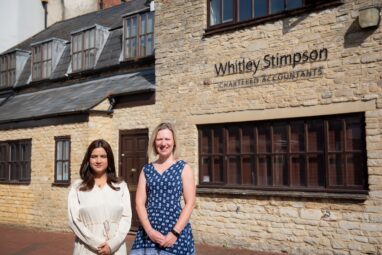
Beware of getting caught in the IHT trap
A generation of pensioners could end up paying thousands of pounds in inheritance tax (IHT) through simple ignorance of rules which can help them avoid it.
A recent report by H.M. Revenue & Customs shows nine percent of over-60s have accumulated wealth in property, savings and other assets worth more than £325,000, the threshold after which IHT kicks in. But it added that more than half don’t have much understanding of the rules.
Now, experts at Banbury accountants Whitley Stimpson are urging older people to have their finances checked before the tax man cashes in on their assets.
One of the main ways of avoiding IHT is by gifting large amounts to immediate family which will then be tax-free, provided you live another seven years after making the gift. That in itself is a gamble and over the last three years £372m has gone to H.M. Revenue and Customs after gifts fell foul of the rules.
Another issue is where individuals give an asset away but still continue to benefit from it. In this scenario the rules say that this is a “gift with reservation of benefit” and complex tax rules mean that this can still be subject to IHT. This is usually the case when parents gift their home to their children but continue to live in the property.
In order for a tax break to apply, those living in the property must pay a market rate of rent to their offspring until they die or go into long-term care. In turn, the extra rental income is taxable for the children at up to 45 per cent for very high earners and if the property appreciates in value then a large capital gains tax could apply when the property is sold.
Often it is better for parents to downsize and arrange for cash to be passed on to their children although this requires careful consideration
Val Buzzard, director and Trust expert at Whitley Stimpson, said: “We are seeing a rising number of clients asking for advice on IHT as it can be very complicated, especially where the family home is concerned.
“No-one wants to pay unnecessary tax and with a little planning it can be successfully avoided. But it pays to have the right professional advice and I would encourage people to visit one of our tax specialists to work out the best way forward for their individual circumstances.”
H.M. Revenue and Customs is now starting to recognise the growing problem. A new, higher threshold called the Residential Nil Rate Band but that is often referred to as the “family home allowance”, is being introduced and is reliant on the home being passed to direct descendants. This allowance now stands at £150,000 and will rise to £175,000 by 2020-21.
This additional allowance means that married couples can pass on estates worth up to £1m to direct descendants, including the family home, free of Inheritance Tax. Estates of more than £2m lose the additional relief at a rate of £1 for every £2 over the threshold.
Those selling a valuable property to downsize or go into care can get an “inheritance tax credit” to qualify for the new threshold provided most of the estate is left to direct descendants.
For further information, contact: Val Buzzard on 01295 270200 or email: Valb@whitleystimpson.co.uk
More in Accountants

Why having an audit can boost your business
Many directors will wince at the prospect of an audit, seeing it as a necessary evil to meet statutory obligations.

FRC Proposes Major Overhaul of Auditing Standards
In a bold move, the Financial Reporting Council (FRC) has unveiled proposed changes to auditing standards that could have a major impact on the financial world, according to chartered accountants and business advisors Whitley Stimpson.

Whitley Stimpson shines as finalist for top national award
Service Charge Accountancy specialist Jonathan Walton of Whitley Stimpson has been recognised for his outstanding work in the field by being shortlisted for a prestigious property industry award.
From this author

Why having an audit can boost your business
Many directors will wince at the prospect of an audit, seeing it as a necessary evil to meet statutory obligations.

Whitley Stimpson welcomes Sushma to Bicester
Leading accountants and business advisors Whitley Stimpson, announces the appointment of Sushma Pandey who joins the company’s Bicester office.

FRC Proposes Major Overhaul of Auditing Standards
In a bold move, the Financial Reporting Council (FRC) has unveiled proposed changes to auditing standards that could have a major impact on the financial world, according to chartered accountants and business advisors Whitley Stimpson.

